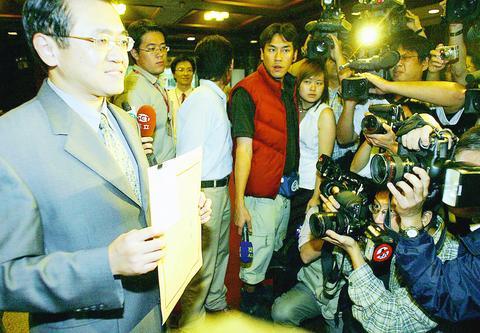The Presidential Office yesterday officially requested the Legislative Yuan to allow President Chen Shui-bian (
Legislative Speaker Wang Jin-pyng (王金平) promised to convene cross-party negotiations by Thurs-day to discuss what would be the first-ever "state-of-the-nation" report.

PHOTO: CNA
"In order to strengthen national security, maintain democracy and freedom, facilitate national progress and development and seek support from both ruling and opposition parties on major national policies, [the president] expects to deliver the special report on three important issues -- the arms procurement budget, the nation's bid to enter the UN and peaceful cross-strait development," the message said.
It was delivered to the Legislative Yuan by Presidential Office First Bureau Chief Leonard Chao (
The message said the request was in accordance with the Fourth Additional Article in the Constitution, which says that the Legislative Yuan can invite the president to make a "state-of-the-nation" address every year.
"We hereby request that the Legislative Yuan arrange for the state-of-the-nation address to be delivered as soon as possible," the message said.
Chen announced his decision to directly communicate with opposition legislators on the arms deal during an address at the Democratic Progressive Party's (DPP) extraordinary national congress on Sunday.
Opposition parties responded yesterday by saying that they wanted a question-and-answer session between legislators and the president to immediately follow the report, while the DPP insisted that this would spoil the spirit of the Constitution and cause a constitutional crisis.
"Chen says that he is willing to further interact with legislators after delivering the special report," Presidential Office Deputy Secretary-General Cho Jung-tai (卓榮泰) said. "The president will respect the Legislative Yuan's decision on how the state-of-the-nation address will proceed because the president expects that the processes will not be `one-way' communication."
The Fourth Additional Article does not state that legislators can demand a question-and-answer session with the president.
Cho's remarks hinted that Chen may stay at the Legislative Yuan to listen to the legislators' suggestions and offer a summary response.
Meanwhile, Wang said that because legislative agendas and budget allocations had already been set, it would be difficult to allow the president to deliver a report before December's legislative elections. But the final decision could be arrived at after negotiations, he said.
Wang indicated that, according to the spirit of the Additional Articles, the right to determine whether the president will report to the Legislative Yuan lies solely with the legislature.
Now that Chen had taken the initiative, and out of respect for the president, Wang said he would convene cross-party negotiations after receiving the request.
On the viability of a question-and-answer session following the president's report, Wang said that if Chen were to come to the Legislative Yuan, he should interact with its members and provide explanations if legislative members have questions.
"Otherwise, how would it differ from making an announcement on television?" Wang said.
Wang also said that there should be no limit placed on topics.

FALSE DOCUMENTS? Actor William Liao said he was ‘voluntarily cooperating’ with police after a suspect was accused of helping to produce false medical certificates Police yesterday questioned at least six entertainers amid allegations of evasion of compulsory military service, with Lee Chuan (李銓), a member of boy band Choc7 (超克7), and actor Daniel Chen (陳大天) among those summoned. The New Taipei City District Prosecutors’ Office in January launched an investigation into a group that was allegedly helping men dodge compulsory military service using falsified medical documents. Actor Darren Wang (王大陸) has been accused of being one of the group’s clients. As the investigation expanded, investigators at New Taipei City’s Yonghe Precinct said that other entertainers commissioned the group to obtain false documents. The main suspect, a man surnamed

DEMOGRAPHICS: Robotics is the most promising answer to looming labor woes, the long-term care system and national contingency response, an official said Taiwan is to launch a five-year plan to boost the robotics industry in a bid to address labor shortages stemming from a declining and aging population, the Executive Yuan said yesterday. The government approved the initiative, dubbed the Smart Robotics Industry Promotion Plan, via executive order, senior officials told a post-Cabinet meeting news conference in Taipei. Taiwan’s population decline would strain the economy and the nation’s ability to care for vulnerable and elderly people, said Peter Hong (洪樂文), who heads the National Science and Technology Council’s (NSTC) Department of Engineering and Technologies. Projections show that the proportion of Taiwanese 65 or older would

Democracies must remain united in the face of a shifting geopolitical landscape, former president Tsai Ing-wen (蔡英文) told the Copenhagen Democracy Summit on Tuesday, while emphasizing the importance of Taiwan’s security to the world. “Taiwan’s security is essential to regional stability and to defending democratic values amid mounting authoritarianism,” Tsai said at the annual forum in the Danish capital. Noting a “new geopolitical landscape” in which global trade and security face “uncertainty and unpredictability,” Tsai said that democracies must remain united and be more committed to building up resilience together in the face of challenges. Resilience “allows us to absorb shocks, adapt under

Taiwan Semiconductor Manufacturing Co (TSMC, 台積電) yesterday said it is building nine new advanced wafer manufacturing and packaging factories this year, accelerating its expansion amid strong demand for high-performance computing (HPC) and artificial intelligence (AI) applications. The chipmaker built on average five factories per year from 2021 to last year and three from 2017 to 2020, TSMC vice president of advanced technology and mask engineering T.S. Chang (張宗生) said at the company’s annual technology symposium in Hsinchu City. “We are quickening our pace even faster in 2025. We plan to build nine new factories, including eight wafer fabrication plants and one advanced